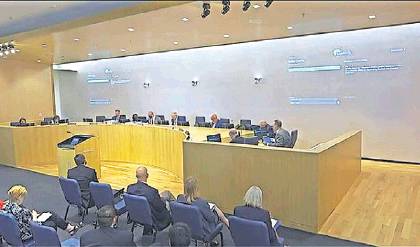Council finalizing budget
Second and final vote next week
By Matt Dotray A-J Media
The Lubbock City Council unanimously approved the proposed FY 2020-21 budget Wednesday evening with no amendments.
The city’s budget calls for decreasing the tax rate from 55.8802 cents per $100 property valuation to 54.1573 cents, tornado sirens, a master plan for public parks, $10 million in street maintenance and other initiatives.
On Tuesday, Sept. 8, the council is scheduled to vote a second and final time to officially adopt the budget. The next fiscal year begins October
1.
In many ways this is a baseline budget. Ther are few large capital projects, few new hires and no employee raises. The city is not making any changes to water, wastewater, storm-water or trash fees.
Wednesday’s vote followed more than an hour of public comments. The public comments, for the most part, fell into two categories. A group of citizens approached members of the city council asking them to decrease the tax rate further.
Despite the decrease to the city’s tax rate, the budget is still projected to collect $1.53 million more in property tax revenue due to new property. The city manager previously told the city council that new property will add $2.39 million from new property added to the tax role. The total budget is for $877 million. The city’s property tax rate exceeds no-new-revenue by 1.06%
City Manager Jarrett Atkinson said the proposed tax rate of 54.1573 cents per $100 property valuation will keep taxes flat for the average homeowner despite an increase in property values. Homes that increased more than the average will pay more.
Prior to the vote the city council discussed several cost-saving measures. The leading candidate was to cut the $1 million for tornado sirens. Atkinson recommended the city not do this, since this is just a one-time expense, not a yearly expense.
Council members Latrelle Joy, Shelia Patterson Harris and Randy Christian expressed an interest in cutting the tornado sirens project. They asked the city manager to get information about what that would do to the tax rate prior to the second and final vote.
The other citizen request during the public hearing was from the Lubbock Compact organization, which is becoming more organized and more active at public meetings. About five members of Lubbock Compact approached the city council, asked them to fund a comprehensive fiscal impact analysis and a scenario-based impact analysis in this year’s budget.
One of Lubbock Compact’s many missions is to stop public dollars being directed from older, existing neighborhoods to new suburban sprawls in developing parts of the city. Lubbock Compact is arguing that the city is allowing development to occur in rural parts of the city without understanding the public cost and the impact it’s having on older neighborhoods.
“I know the idea is that these new infrastructures will bring in tax dollars, but take into consideration that they will also require maintenance — maintenance that our older historical communities require now,” said Natalie Ayers of Lubbock Compact.
A fiscal impact analysis was included as a recommendation in Plan Lubbock 2040.The plan adopted at the end of 2018 says a fiscal impact analysis is an accepted methodology to look at revenues and expenses by land use type, which in these new developments is commercial along the thoroughfares connecting single-family neighborhoods.
“The City should develop a fiscal impact model to calculate the various impacts and ’fine tune’ its future land use pattern,“ the plan says. The recommendation was under the category of planning for future growth.
Members of the city council had questions about the cost of this study, and asked city staff to have that information before the final vote.
This study wasn’t in Plan Lubbock 2040’s top recommendation, which Mayor Dan Pope pointed out. He said the city council is prioritizing the top recommendations first; these include impact fees and the unified development code currently being considered.
When the city council meets in the fall to discuss priorities moving forward, Pope said this will be up for discussion.
Citizens thanked the city for the creation of a new staff position included in the budget, which is a planner specifically focusing on north and east Lubbock neighborhoods.
